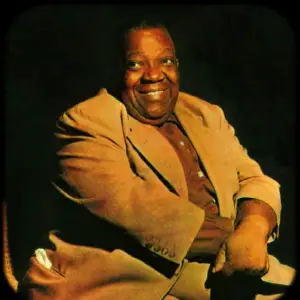JIMMY RUSHING
 ‘Mister Five-by-Five’ was probably the loudest Blues Shouter of them all. Fronting the Count Basie Orchestra, Jimmy Rushing was still capable of injecting great emotional force into his performances at a volume that barely needed a microphone! His careful phrasing brought the Blues into the repertiore of swing bands as Count Basie’s front-man; his up-tempo Jump-Blues was popular in the post-WWII era; he continued as a solo artist from 1950; and he appeared in films and at Festivals all over the world in the 60s. Jimmy got the ‘Five by Five’ tag from a 1942 song by Ella Mae Morse, and that big voice came from a very solid foundation.
‘Mister Five-by-Five’ was probably the loudest Blues Shouter of them all. Fronting the Count Basie Orchestra, Jimmy Rushing was still capable of injecting great emotional force into his performances at a volume that barely needed a microphone! His careful phrasing brought the Blues into the repertiore of swing bands as Count Basie’s front-man; his up-tempo Jump-Blues was popular in the post-WWII era; he continued as a solo artist from 1950; and he appeared in films and at Festivals all over the world in the 60s. Jimmy got the ‘Five by Five’ tag from a 1942 song by Ella Mae Morse, and that big voice came from a very solid foundation.
James Andrew Rushing was born in Oklahoma City in 1901 into a family in love with music: his father played trumpet and his mother and brothers were all singers. Young Jimmy learned violin and piano, and enrolled at Wilberforce University to study music. He dropped out of college to go to California, where he played the club scene for a while, singing with Jelly Roll Morton on occasion. Returning to the mid-West, Jimmy joined bass-player Walter Page’s Blue Devils in Kansas City, where they recorded for Vocalion in 1927. He met Bill ‘Count’ Basie and both men joined Bernie Molin’s Big Band in 1929. When Bernie passed away, Count Basie started his own Orchestra, with Jimmy out front and Lester Young on tenor sax. Basie’s band favoured an up-tempo ‘Kansas City Stomp’ dance music that formed the foundation of jump-Blues. Jimmy’s extrovert vocal style gave the band great energy and their performances at the Apollo Theatre, and the Savoy and Roseland Ballrooms fuelled the jitterbug craze in New York.
Jimmy singing with Benny Goodman’s band;
Jimmy Rushing Discography
This is actually a CD re-issue of ‘Livin the Blues’ and ‘EveryDay’, two of the best post-Basie albums by Jimmy.